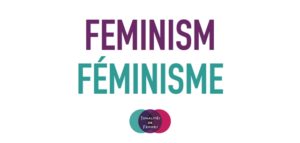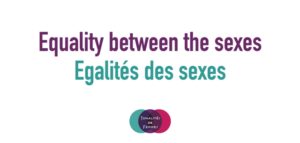TdF celebrates International Women’s Day, here is the follow up of our debate.
Chiara Gerlich : Where do you see the strength of women to face these struggles in life?
Sonia Johnson : Their strength is unwavering. Women who are dedicated, political women, researchers, writers and women in every other influential profession will develop incredible resources through their careers to advance the group of conscious women we are. Some will go about this from every angle at once, education, career, relationship, environmental sustainability, or even by being active in organisations fighting violence. These are the challenges, which are linked to life paths, often related to personal pain. I have this vision of invisible forces, which are active to create an egalitarian society, opening up with the understanding of the feminists from the past century. These Women of Action have given us access to education, to vote, to pill, to abortion, to liberty! I want to respect their action and let them define the terms of their movement, which has been essential for us today. I am of course in a non-religious context, everything unfortunately still needs to be achieved for the women of the world. But that would be a whole other debate.
And Chiara, talk to us about these inequalities, which disturb you in public, private and professional spaces?

Chiara Gerlich : I find myself really struggling to find the words to answer this question shortly, because the problems I see are so blatant to me and to list them almost seems trivial, yet they are so profound. Speaking about the Austrian context about 30 to 40 women die annually from domestic violence. In a global comparison this is sadly not a staggering figure, even though one women annually would be enough of a tragedy. Women are more likely to be underemployed – working part-time although they need full-time work. Women are still underrepresented in highly paid and highly influential positions. Sure, we have the odd president, CEO or specialist doctor who is a women, but in the vast majority of cases women work in lower ranking and lower paying jobs than men. Often times they are even payed less for the same job (gender pay gap). They are still expected to take on the triple challenge of work, housework and taking care of family members (children, elderly and disabled) totally free of charge or compensation later on, such as a pension that would reflect their efforts and sacrifice of giving up paid work. They are much more likely to be victims sexual harassment and assault than men. The list goes on.
Which kind of terminology would you be happy with?

Sonia Johnson : We are Women of Action and together, with men, we will manage to combat the shocking adversary, all these persistent inequalities, all the discriminations linked to gender and all that is slowing us down, which you are describing Chiara. With ‘Tonalités de Femmes’ I am hoping that we can continue to highlight women for a long time on all their paths as Women of Action, Women of Hope and Women of Life; women who are facing these struggles and standing on the shoulders of the feminists to continue on their progress.
Is there a way in which you can consider a hopeful perspective on this subject, Chiara?
Chiara Gerlich : Yes, I can definitely see a lot of hope in the situation and potential for progress. Like you, I am also confident in women and men to solve many of the problems I see, but I think that we can only solve them by naming them and bringing attention to them. However, this is a wonderful opportunity to explore my strong personal response on a deeper level and I look forward to keeping this conversation going!
Sonia Johnson : Thanks a lot for this great adventure Chiara, and yes, more soon! In France, women will stop to work at 3.40 because after that, many of us are not paid anymore!







I am a feminist and not afraid of the word!
Je ne suis pas intéressée par la Journée Internationale de la Femme. J’aime mes différences et je suis pragmatique. Nous donnons vie à nos enfants et nous aurons toujours à nous occuper d’eux. Donc pourquoi vouloir des carrières égales à celle des hommes ? Pourquoi ne pas essayer de cultiver nos différences et nous rapprocher des hommes pour une danse à deux, vers le sens de nos épanouissements respectifs ? Mais tous ces sujets étaient agréables à lire. Merci.